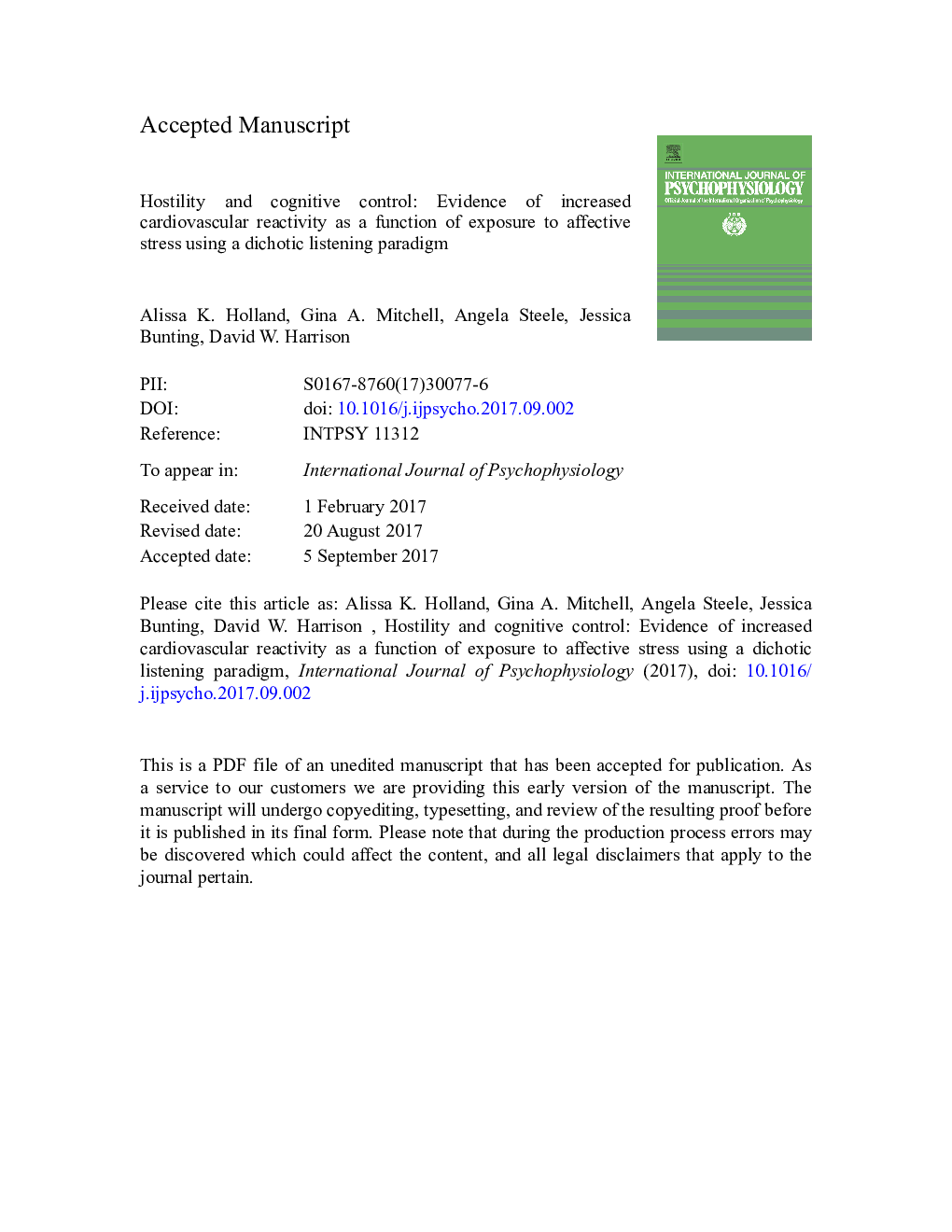| کد مقاله | کد نشریه | سال انتشار | مقاله انگلیسی | نسخه تمام متن |
|---|---|---|---|---|
| 8947905 | 1645618 | 2018 | 50 صفحه PDF | دانلود رایگان |
عنوان انگلیسی مقاله ISI
Hostility and cognitive control: Evidence of increased cardiovascular reactivity as a function of exposure to affective stress using a dichotic listening paradigm
ترجمه فارسی عنوان
خصومت و کنترل شناختی: شواهدی از افزایش واکنش قلبی عروقی به عنوان یک عامل از قرار گرفتن در معرض استرس عاطفی با استفاده از پارادایم گوش دادن دیاکواتیک
دانلود مقاله + سفارش ترجمه
دانلود مقاله ISI انگلیسی
رایگان برای ایرانیان
کلمات کلیدی
خصومت، کنترل شناختی، مدل ظرفیت عملکرد لبه جلویی، گوش دادن دوشیزه، زوال مغزی،
ترجمه چکیده
شاخص های کنترل شناختی در مردان با سطوح بالا و پایین خصومت روانی به عنوان تابع قرار گرفتن در معرض استرس عاطفی و شناختی مورد بررسی قرار گرفتند. پارادایم کار دوگانه همزمان مورد استفاده قرار گرفت که به موجب آن شرکت کنندگان عمدا به گوش گوش چپ یا راست تحت شرایط گوش شنوایی قبل و بعد از قرار گرفتن در معرض آوازخواران خشمگین نوزاد تمرکز کردند. تجزیه و تحلیل داده های رفتاری، پیش بینی کاهش کنتراست کنترل قانونی جلو در مردان با سطوح بالای خصومت را نشان می دهد که نشان دهنده کاهش توانایی برای سرکوب گزارش های فون های ارائه شده به نیمکره چپ غالب زبان (گوش راست) در حالت چپ فوکوس است. این کاهش در ظرفیت برای سرکوب کردن گزارش از واجهای که به گوش راست در وضعیت چپ فوکوس ارائه شده، نشان دهنده کاهش کنترل شناختی است. با توجه به داده های عصبی فیزیولوژیکی، ضربان قلب تنها برای مردان با سطح بالایی خصومت در حالت چپ فوکوس افزایش یافته است، و این امر به ویژه در شرایط تنش پس از عاطفه مشهود است. این افزایش در ارتفاعات نیمکره راست نشان دهنده شواهد اضافی در مورد کاهش کنترل شناختی و حمایت از مدل ظرفیت خصومت است که از طریق تأثیر کنترل ضعیف راست راست جلو در ناحیه سمت راست خلفی مغز در شرایط کاری دوگانه صورت می گیرد. نتایج به دست آمده از لحاظ ادغام ساختار کنترل شناختی به مدل ظرفیت و همچنین ارائه پیام هایی در رابطه با کاهش توانایی برای سرکوب پاسخ های غلط تهاجمی در محیط های داخلی مورد بحث قرار می گیرد.
موضوعات مرتبط
علوم زیستی و بیوفناوری
علم عصب شناسی
علوم اعصاب رفتاری
چکیده انگلیسی
Indices of cognitive control were examined in men with high and low levels of trait hostility as a function of exposure to affective and cognitive stress. A dual concurrent task paradigm was used whereby participants intentionally directed focus to the left or right ear under dichotic listening conditions before and after exposure to angry infant vocalizations. Analysis of the behavioral data supports the prediction of reduced right frontal regulatory control in men with high levels of hostility as indicated by diminished capacity to suppress report of phonemes presented to the language dominant left hemisphere (right ear) in the Focus Left condition. This diminishment in the capacity to suppress report of phonemes presented to the right ear in the Focus Left condition is suggestive of reduced cognitive control. With respect to the neurophysiological data, heart rate increased for only men with high levels of hostility in the Focus Left condition, and this was especially evident in the post-affective stress condition. This increase in right hemisphere arousal provides additional evidence of reduced cognitive control and support for the capacity model of hostility by implicating poor right frontal regulatory control over right posterior cerebral regions under dual task conditions. The results are discussed in terms of integrating the construct of cognitive control into the capacity model as well as providing implications regarding reductions in the capacity to suppress predominant aggressive responses in domestic settings.
ناشر
Database: Elsevier - ScienceDirect (ساینس دایرکت)
Journal: International Journal of Psychophysiology - Volume 131, September 2018, Pages 57-66
Journal: International Journal of Psychophysiology - Volume 131, September 2018, Pages 57-66
نویسندگان
Alissa K. Holland, Gina A. Mitchell, Angela Steele, Jessica Bunting, David W. Harrison,
